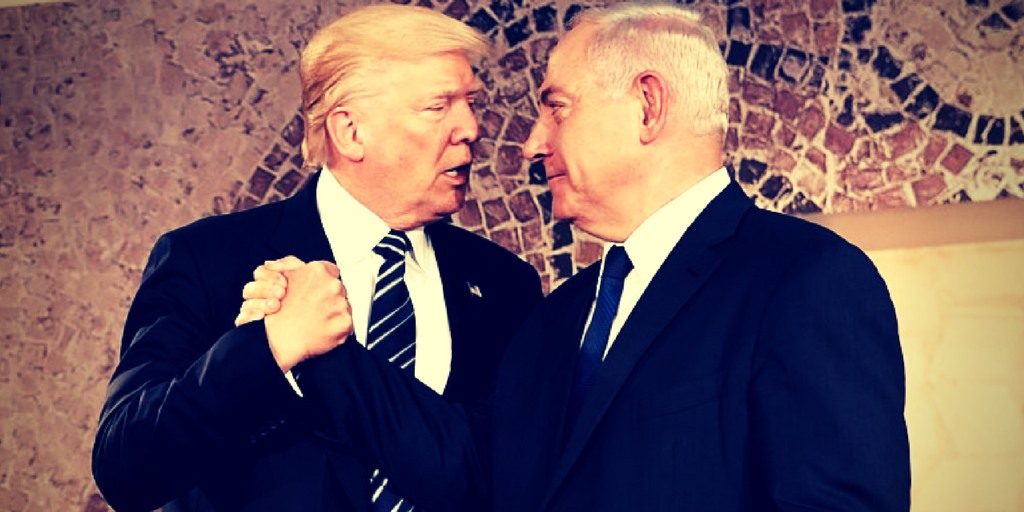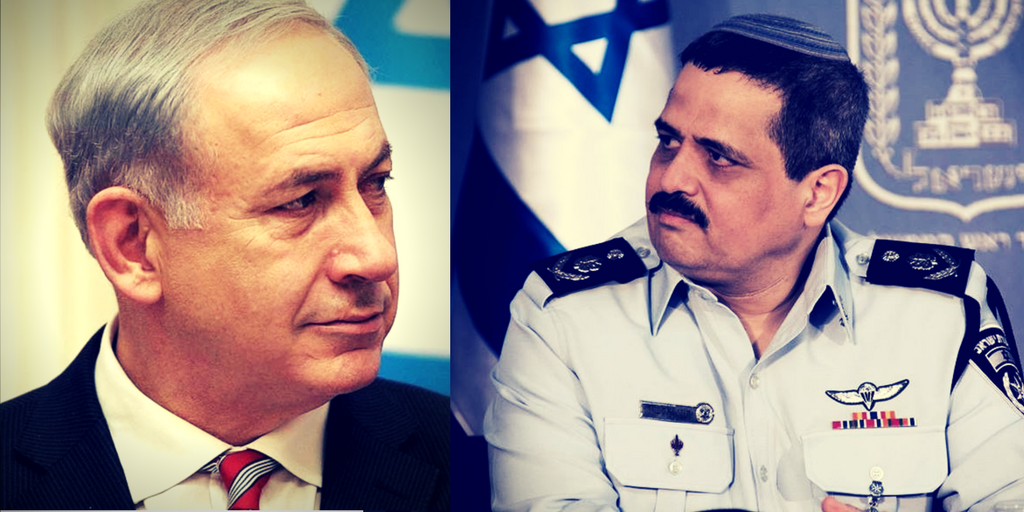The Israeli police investigation against Israeli Prime Minister Benjamin Netanyahu shows remarkable similarities with the Special Counsel probe against President Donald Trump in the United States.
During the prime time news broadcasts Tuesday evening in Israel, the dramatic news was announced that Israel Police investigators are recommending that Israel’s Attorney General, Avichai Mandelblit, indict Prime Minister Benjamin Netanyahu on bribery and breach of trust charges in two investigations.
The news raises a number of obvious questions about Netanyahu’s political future. But it also raises an equal, if not greater, number of questions about the purity of the police service’s intentions and its trustworthiness.
Let us begin by considering the specific cases that form the bases of police recommendations against Netanyahu.
The first investigation has been dubbed Investigation 1000 by the Police’s main criminal investigations unit, Lahav 433. The investigation surrounds the relationship between Netanyahu and his old friend, Israeli businessman and Hollywood movie producer Arnon Milchen. The police have recommended that Milchen be indicted for paying bribes to Netanyahu. The police recommend indicting Netanyahu for taking bribes from Milchen and acting illegally on his behalf.
According to Israel’s Hadashot television news, this investigation was the top story in terms of volume of coverage during 2017.
The police allege that between 2007 and 2016, Milchen showered Netanyahu and his wife Sara with cigars, champagne, and jewelry, often purchased at their request. In 2014, Milchen’s business partner, Australian businessman James Packer, who was also a friend of Netanyahu and his family, allegedly began giving similar gifts to the Netanyahu family.
In exchange for those gifts, the police allege that Netanyahu supported extending a law passed in 2008, when Netanyahu was the head of the parliamentary opposition, that gave returning Israeli expatriates tax forgiveness for ten years of unpaid back taxes. That is, Israeli expatriates were not liable for Israeli income tax for their global income earned over the decade before they returned to Israel.
According to the police, after Netanyahu returned to office in 2009, Milchen lobbied Netanyahu’s finance minister at the time, Yair Lapid, to extend the tax forgiveness period. Lapid, who is now in the opposition, heads the center-left Yesh Atid party. If Netanyahu’s Likud party fails to win the next election, according to the polls, Lapid and his Yesh Atid party will form the next government.
In other words, today, Lapid is Netanyahu’s chief political rival.
On Tuesday, the police told reporters that Lapid is the key witness against Netanyahu in Investigation 1000.
In other words, Netanyahu’s chief political rival is the key witness against him.
Lapid reportedly told investigators that Netanyahu asked him twice to advance Milchen’s request to extend the period of tax forgiveness to returning expatriates beyond the ten years granted by the law. Lapid and the finance ministry opposed Milchen’s proposal, and his initiative went nowhere.
Netanyahu also allegedly intervened on behalf of Milchen in two proposed deals related to Israeli television stations that Milchen either owned or wished to own.
But then, neither of his proposed interventions, if they occurred, were successful.
The police report that Netanyahu intervened on Milchen’s behalf when the latter was experiencing difficulty renewing his residency visa in the U.S. Netanyahu called then-Secretary of State John Kerry and asked him to intervene on Milchen’s behalf to renew his residency visa.
Since Milchen stood to lose a significant amount of money if he was unable to remain in the U.S., the police claim that Netanyahu’s intervention on his behalf with Kerry represented the return on Milchen’s gifts.
Milchen himself has a long record of service to Israel’s Mossad — its foreign spy service — and reportedly has contributed significantly to Israel’s defense. Netanyahu claims that he acted out of respect for Milchen’s long service to Israel’s security. In addition,, Israel’s late president and prime minister, left-wing icon Shimon Peres, also intervened on Milchen’s behalf with U.S. authorities.
In the second probe, dubbed Investigation 2000, the police recommend indicting Netanyahu following a discussion he held – and recorded surreptitiously – in 2014 with Arnon Mozes, the publisher and controlling owner of Israel’s mass circulation daily, Yediot Ahronot. The police found the recorded conversation on the mobile phone of Netanyahu’s former chief of staff, Ari Harow, who is the subject of a separate and unrelated influence-peddling probe. Netanyahu claims he recorded their conversation on the advice of his attorney because he was afraid that Mozes would try to extort him.
The police claim that the conversation is proof that Mozes offered Netanyahu a bribe and that Netanyahu accepted the offer. They recommend charging Mozes with bribing Netanyahu, and charging Netanyahu with accepting a bribe from Mozes.
The odd thing about this claim is that no deal was struck. To the contrary.
Mozes is Netanyahu’s nemesis. Yediot Ahronot is the most influential newspaper in Israel. Its front page dictates the daily news programming for radio and television broadcasts. And Yediot Ahronot‘s coverage of Netanyahu is implacably hostile to the premier and to his family. To a lesser but significant degree, Yediot Ahronot is also deeply hostile to the Israeli political right.
According to the recording of the men’s conversation, which was leaked to the media by the police more than a year ago, Netanyahu and Mozes discussed an elaborate scheme to change the newspaper market in Israel in Yediot Ahronot‘s favor.
Israel’s largest circulation paper is Israel Hayom, a free tabloid that is owned by conservative American billionaire — and Netanyahu supporter — Sheldon Adelson. In their recorded conversation, Mozes raised the possibility of Netanyahu curtailing government advertising in Israel Hayom and working to cut back its circulation in order to increase Yediot Ahronot‘s market share.
In exchange, Mozes offered to scale back the negative tone of his paper’s coverage of Netanyahu.
In the event, nothing came of the conversation. Indeed, in late 2014, against Netanyahu’s expressed wishes, then-justice minister Tzipi Livni put forward a controversial media bill, which was based on a legal opinion written by Yediot Ahronot‘s legal advisor. The bill, which was dubbed the “Israel Hayom law,” would have forced the shutdown of the paper by barring its owners from not charging money for it.
The law passed a preliminary reading in the Knesset with 43 votes. Netanyahu and his Likud Party voted against the bill. Moreover, to prevent the bill from going forward, Netanyahu disbanded his government and the Knesset and called new elections a bit more than a year into his term.
In other words, to prevent any harm to Israel Hayom – and transitively, to prevent any advantage from being accrued to Yediot Ahronot — Netanyahu took the radical step of standing for election again.
For more than a year, the police refused to investigate any of the 43 lawmakers who voted in favor of the bill, or to analyze the coverage they received in Yediot Ahronot in following their support. Three weeks ago, the bill’s sponsor, Labor Party member of Knesset Eitan Cabel — who enjoyed extraordinary coverage in the paper — was brought in for a brief interview.
In other words, the police are recommending that Netanyahu be indicted for a conversation that went nowhere, which he recorded. And the police are not investigating 42 out of the 43 lawmakers that supported a move that would have given Mozes everything he asked Netanyahu for, but didn’t receive, while the 43rd lawmaker was subject merely to a brief interrogation.
This brings us to the police.
Since Netanyahu served his first term as prime minister from 1996 until 1999, he and his wife Sara have been the subjects of 19 police probes and or investigations. The Hebrew language website Mida.org.il has published a review of all of them earlier this month.
The police recommended indicting the Netanyahus in three probes in 1999. The attorney general rejected their requests.
In January 2017, the attorney general closed four probes of Netanyahu that had been ongoing since 2009.
In September 2017, the attorney general closed six police probes against Sara Netanyahu, which the police had opened in 2015. One probe, relating to an administrative, rather than criminal, charge that Mrs. Netanyahu ordered food from restaurants instead of using the services of the cook at the prime minister’s residence, is still under review.
Two other probes, related to accusations that a French businessman gave Netanyahu illegal campaign contributions, and that the Likud overpaid a secretary in the U.S., disappeared after leading the headlines for several news cycles in 2016.
Of the three open cases, the Milchen and Mozes investigations led to Tuesday night’s announcement of the police’s recommendations. A third investigation, of influence-peddling related to Israel’s purchase of submarines from Germany, is unrelated to Netanyahu, but since his associates are under investigation, his name was dragged into the discourse related to the probe.
The endless stream of criminal investigations against Netanyahu has involved investigating witnesses across the globe, and has cost tens of millions of shekels to Israeli taxpayers.
At the end of this long, 22-year road, what we have are just two charges — which, if anything, show that Netanyahu is probably most worthless bribe-taker in history. Aside from assistance with his residency visa in the U.S., Netanyahu provided Milchen with no meaningful support in any of his endeavors. The one piece of legislation that passed, the law that entitles returning Israeli expatriates with ten years of debt forgiveness, passed when Netanyahu was out of office.
Over the past eight years of Netanyahu’s tenure as prime minister, none of Milchen’s proposals in either the media market or tax laws was advanced even slightly.
As for Investigation 2000, it is almost impossible to understand the basis for the charge against Netanyahu. Mozes apparently offered him a bribe, in the form of diminished hostility in his newspaper in exchange for a larger market share for Yediot Ahronot. But Netanyahu did nothing to advance his offer. To the contrary, he preferred new elections to curtailing Israel Hayom‘s operation.
Over the past year, as the police investigations dragged on, investigators fed the media with a never-ending stream of negative leaks that all disparaged and vilified Netanyahu.
The police campaign against Netanyahu reached its peak last Wednesday night. Police Commissioner Roni Alscheich, whom Netanyahu appointed in 2015, gave an hour-long interview on Israel’s leading television magazine Uvda, or “Fact.”
Alscheich claimed that Netanyahu was behind three separate, arguably felonious conspiracies against the police. Netanyahu, he alleged, had arranged for private detectives to “sniff around” the families of his investigators to try to find dirt on them.
Netanyahu, he claimed, conspired with a female police officer who in 2011 brought sexual harassment charges against her commander, Police Superintendent Roni Reitman, the head of Lahav 433, the unit responsible for investigating Netanyahu. Alsheich claimed that Netanyahu was behind the police officer’s decision to petition Israel’s Supreme Court against Reitman after the Attorney General chose to close the investigation against him without indicting him in 2015, due to the passage of time since his alleged acts of harassment took place.
Alsheich also claimed that Netanyahu had offered himself a sort of bribe. The Commission of Police alleged that when Netanyahu appointed him to serve as police chief, Netanyahu knew that Alsheich really wanted to serve as Director of the Israel Security Agency, where he was serving as deputy director when Netanyahu asked him to take over the police. Netanyahu, Alsheich alleged, told him that if Netanyahu was still prime minister when Alsheich finished his tour of duty, Netanyahu would appoint him the head of the Israel Security Agency.
Even the police’s most fervent media supporters were aghast at Alsheich’s allegations – coupled with the fact that he has refused to investigate any of them. To summarize: just as the police were set to announce their recommendations, Alsheich made clear that he has a personal vendetta against Netanyahu and is prepared to overthrow his government.
Alsheich’s wild charges that Netanyahu was actively conspiring against his investigators gave credence to the allegations of bias, verging on animus, leveled against the police by Netanyahu and his supporters.
And so the parallels between the indictment of Netanyahu and the witch hunt against President Trump are remarkable. But there is a key distinction.
The U.S. is governed by a constitution that places checks and balances on the executive that extend to the permanent bureaucracy. In Israel, there are no constitutional checks on the bureaucracy. The Knesset cannot compel civil servants to appear before its committees. It cannot force civil servants to testify under oath. It cannot hold them in contempt.
After his scandalous interview last week, Likud Party lawmakers requested that Alsheich come before the relevant committee and explain his charges against Netanyahu. Although he tentatively agreed to appear this week, on Tuesday night, reporters said that Alsheich has no intention of appearing before lawmakers to answer their questions.
Some commentators claimed on Tuesday night that the police deliberately threw every possible charge at Netanyahu to pressure the Attorney General into indicting him for something. The bias against Netanyahu that Alsheich revealed so extravagantly in his interview last Wednesday night, and the thousands of hours and tens of millions of shekels that the police have invested over the past 22 years in their endless pursuit of Netanyahu and his family, now stand in the balance.
If Netanyahu is cleared — and given the weakness of the charges against him, it’s hard to see how he can be indicted — then the police will lose their credibility and the public trust.
Then again, given that Israel’s elected officials have no oversight over the civil service, it could be that Alsheich and his officers don’t care.
Originally Published in Breitbart.



